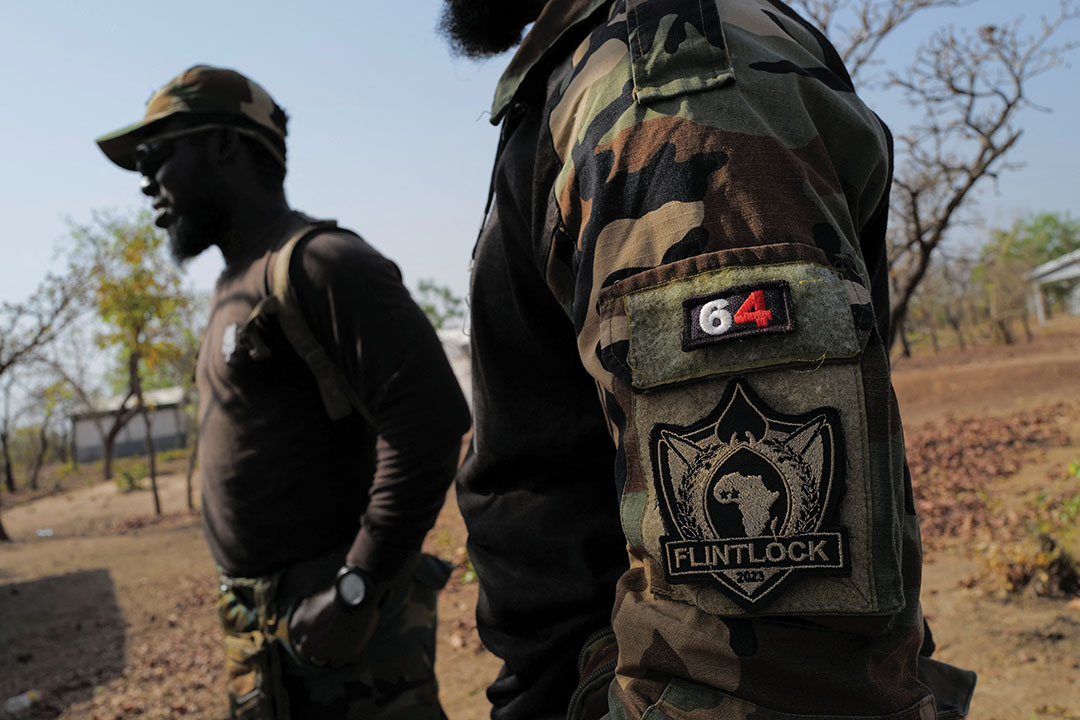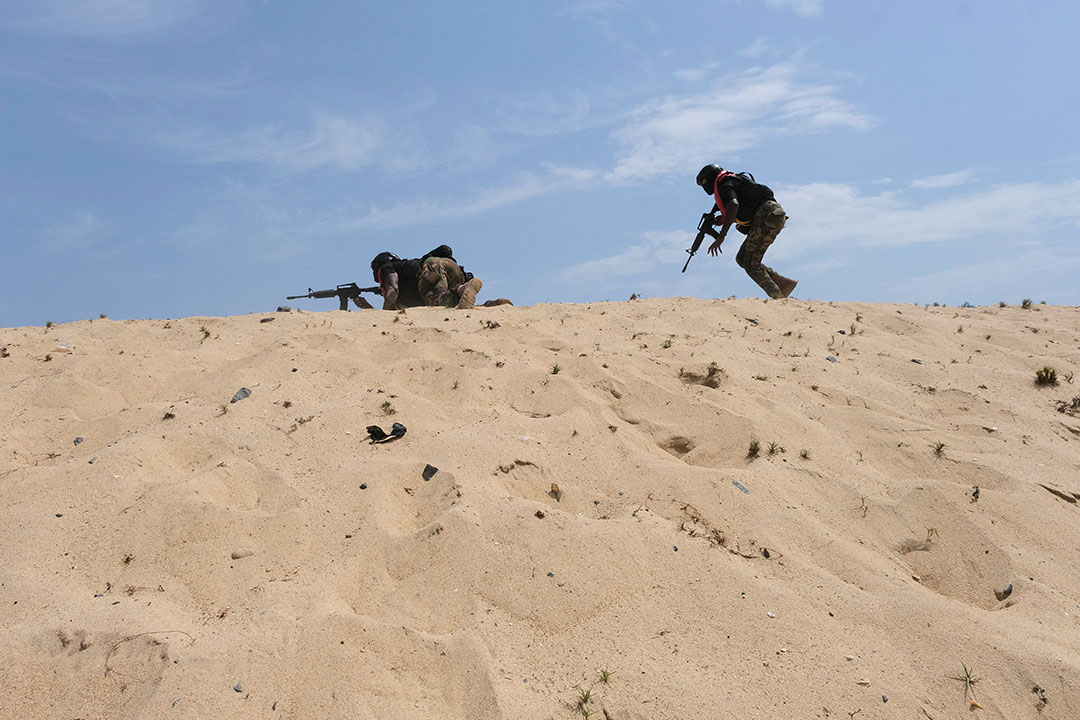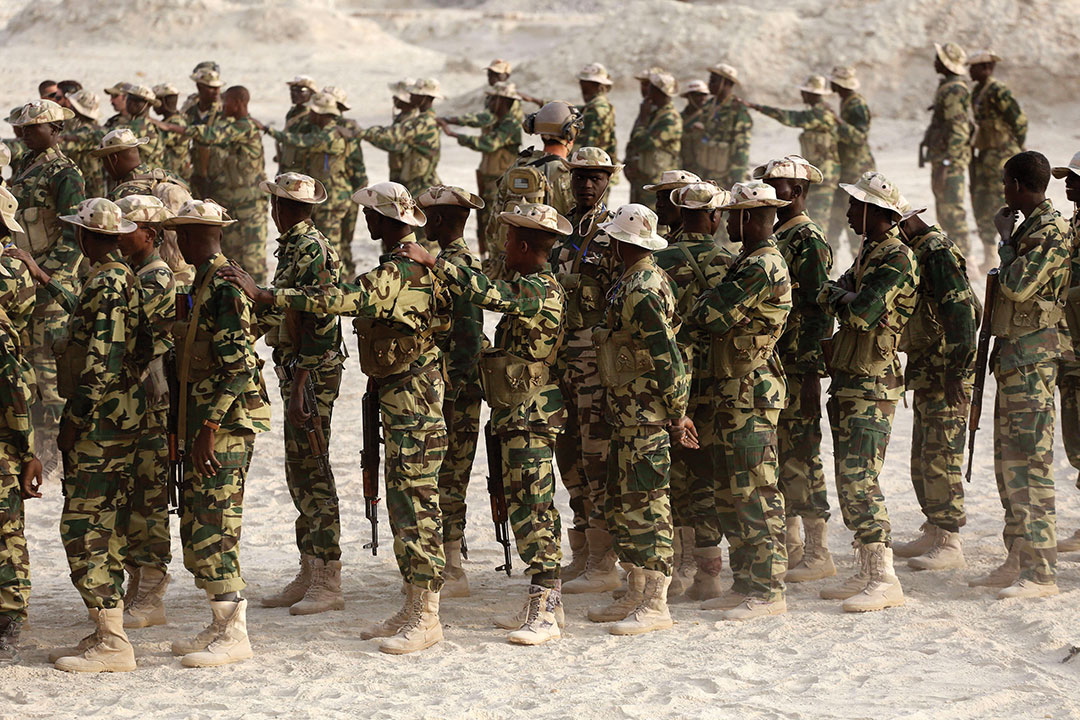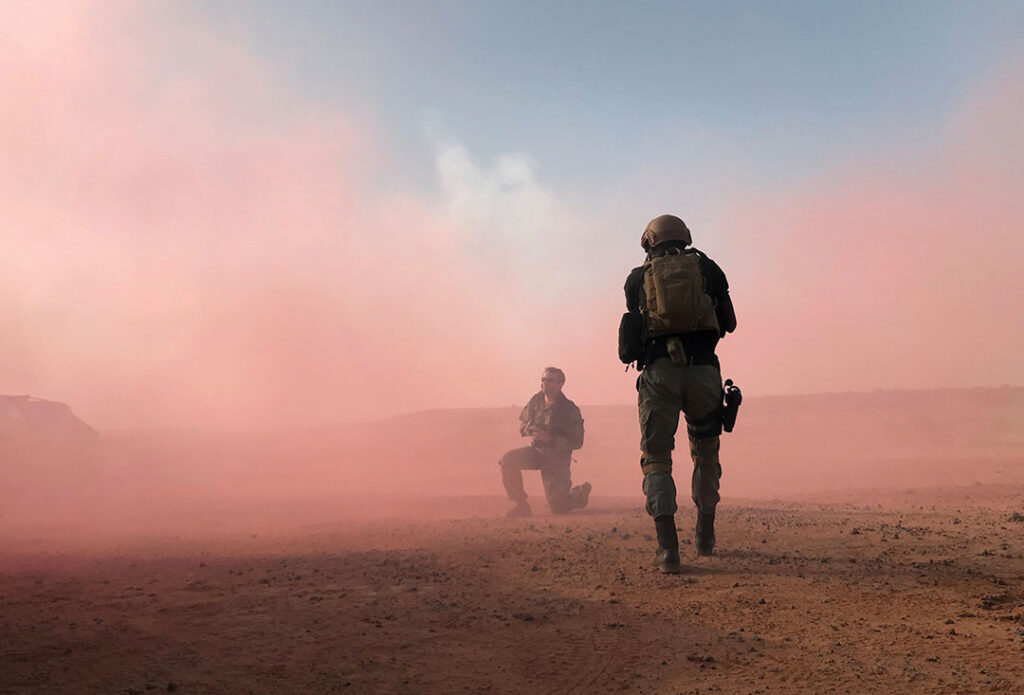COMMANDER SETH ANTHONY DZAKPASU, GHANA ARMED FORCES | photos by reuters
As the threat of violent extremism was growing in the Sahel and West Africa in 2005, U.S. Africa Command sponsored a new exercise. It was designed to tackle the threat head-on by bringing together special operations forces (SOF) from across the region and pairing them with allies from Europe and North America.
From its first iteration, which included seven African nations and more than 700 Soldiers, Flintlock has focused on special operations task units and operator level training for SOF. These operators are some of the best of the best in their respective countries. They are typically the first sent in to conduct delicate missions such as hostage rescue or to neutralize high-value terror targets.
SOF units in Africa have much in common, but before Flintlock they rarely trained together. Barriers of language, doctrine, equipment and national policies led to SOF silos in which operators didn’t coordinate their efforts and leaders seldom shared intelligence or best practices. Extremist groups often capitalized on these divisions, seeking out weak, ungoverned areas to establish bases, recruit and operate with impunity across borders.
The aim of Flintlock was simple: help participating nations counter violent extremist organizations, collaborate across borders, and provide security for their people, while respecting human rights and building trust with civilian populations.
On its 20th anniversary, it’s worth assessing the record to see where Flintlock can go from here.

Growth and Opportunity to Fill Gaps
Flintlock, in its present form, is the largest deployment of SOF partners in Africa, and arguably, the world. Annually, more than 1,300 personnel representing 30 African and international partners deploy to enhance cooperation and interoperability, and forge enduring partnerships that pay dividends in lives saved. In its 20 years, it has grown in scale and scope while identifying several critical gaps in training, disparities in SOF capability, and opportunities to improve cooperation and interoperability between African and international partners.
The most glaring, time-sensitive challenge relating to SOF also might be the most impactful opportunity. This is the development of standardized concepts and doctrine. To be effective and universally accepted, this doctrine must be developed by, with and through African SOF. As the principal medium of collaboration in counterterrorism in West and North Africa, Flintlock is best positioned to support the development of an African SOF doctrine.
As a participant and planner for the exercise, I would like to lend my voice to those calling for development of a doctrine and concept of SOF in Africa. The time is right. As terror groups seek to expand and regional alliances in the Sahel splinter or are under threat, I believe SOF cooperation today is more important than ever.
Smaller Can Be Better in SOF
In Flintlock, the concept and doctrine of SOF centers on the seminal work of retired U.S. Navy Adm. William McRaven, who propounded the “relative superiority” theory. In his book “Spec Ops,” he drew lessons from conflicts dating to World War II to outline foundational SOF ideas. In conventional warfare, a force defending a position is inherently stronger than one on the offensive. This leads to the conventional need to have an attacking force that is triple the size of the defensive force. But in SOF, this conventional wisdom is flipped on its head. Small SOF units can have unconventional and extraordinary capabilities. By examining operations ranging from a British commando raid in St. Nazaire, France, in 1942 to the Israeli rescue of hostages at the Entebbe, Uganda, airport in 1976, McRaven demonstrates the power of these small, elite units. McRaven writes that SOF gain the upper hand when they have a “simple plan, carefully concealed, realistically rehearsed and executed with surprise, speed and purpose.” This concept indicates that SOF should have smaller executing elements or task units when compared to conventional units.

Variations in SOF Concepts and Doctrine in Africa
African militaries often include indigenous structures that predate the modern era and colonial structural legacies. Elite military units in West and North Africa come in the form of commando, ranger, diver and paramilitary organizations. However, these types of military organizations are inherently different from doctrinal SOF units conducting SOF missions. In one country, an elite unit might be conducting counterinsurgency operations or combating banditry. In another, it might be tasked with protecting critical national infrastructure or natural resources.
Often during Flintlock there is evidence of some African nations crisscrossing conventional and elite concepts with that of SOF. African nations present dissimilar sizes of task units. Some are as large as conventional units, which makes it difficult to achieve the needed speed, security and surprise vital to SOF missions. There are challenges with interoperability and tactics when nations with small SOF units work with nations with conventional-sized units. Some nations at Flintlock might use larger units due to unique challenges with operation in their national context and terrain. A review of the operational context of African SOF, grounded in an understanding of established concepts and doctrine to harmonize sizes of task units, could overcome these challenges.
Harnessing SOF Power
SOF can be employed as an instrument of national power, sometimes termed SOF power. SOF power typifies the capability of a small military force punching above its weight in politically and militarily sensitive environments, but at a low cost to the state. We have seen this on display in places such as Mali, where Chadian SOF took back terrain from extremists, and in Nigeria, where SOF units have rescued hostages held by Boko Haram. Even in the Gulf of Guinea, small commando units have liberated seafarers from the clutches of pirates and helped secure the waters for commerce.
The level of development and context of African nations affect the employment of SOF power in national strategy. The economic power of a state affects the military assets and equipment available to SOF. The technological advancement and growth of military industries influence the development of niche equipment and weapons and their maintenance. The concepts and doctrine on SOF and SOF employment must reflect that African nations don’t have the same level of resources as many Western countries. SOF in Africa will not have the same focus on technology and support assets. However, although gaps might exist in technological capabilities, the experience of African operators and their ability to navigate uniquely difficult climate, terrain and threat matrices give them an advantage over forces that rely heavily on technology. As is often stated by experienced SOF operators: “Humans are more important than hardware.” An African SOF doctrine should reflect this reality.

Broadening Objectives
Flintlock has provided tremendous benefits in creating awareness of the importance of SOF in counterterrorism operations and in the wider context of crisis response. The effects reach political, economic and social aspects of nations through engagements with senior leaders, interagency integration, local civic-military action programs, humanitarian assistance, developmental projects, public messaging and information operations. Each Flintlock iteration includes events such as medical assistance programs or veterinary programs that reach thousands of people. This has developed over the years, as has the recognition that there is no such thing as a military-only solution to violent extremism. The problem must be addressed holistically by responding to the root causes of the scourge and by winning the hearts and minds of those closest to the violence.
The exercise has broadened its objectives by not simply defeating terrorist and violent extremist organization networks, but by helping SOF gain the trust of local people through demonstrated adherence to the rule of law and applicable legal frameworks that support civil authorities. When communities see SOF personnel up close, they tend to be reassured that they are professionals who can be trusted. Many countries have complicated legacies to overcome, and the goal is for civilians to understand that, in the event of an emergency, they can run toward their armed forces instead of away from them.
Mapping a Strategy
The approach to developing concepts and doctrine for SOF in Africa needs to be inclusive and comprehensive. This is not an easy undertaking. Developing a common language of concept and doctrine for SOF in Africa will be challenging, but the challenges pale in comparison to the real-world challenges that North and West Africa face from violent extremism. In 2024, there were 10,400 deaths connected to militant Islamic violence in the Sahel, making it the most terror-affected region in the world. There is no time to waste in addressing this threat.
Developing a joint framework for SOF in Africa is vital to address current threats as decades of experience have shown us that malign actors do not respect or adhere to geographic boundaries. As U.S. Special Operations Command Africa commander Rear Adm. Ronald Foy stated: “No one country can address and solve these challenges alone.” This expression not only lends credence to the importance of common concepts and doctrine for SOF in Africa but also shows that we must address the threats of today and be prepared for the challenges of tomorrow.
Flintlock has undergone huge changes in objectives and delivery over the past 20 years. What initially was designed as a joint-combined exchange model of hierarchical, multilateral training, with international forces serving as mentors and African SOF as trainees, continues to morph into a more mutually beneficial and collaborative culminating training event. It is vital that all parties continue to understand the structure of the receiving SOF units by gathering information of internal workings. More discussions with leadership in African SOF are needed to make advances toward fighting a common threat. A useful methodology would be a systems approach, which would require extensive engagements with SOF and other subregional agencies and Western partners. When done correctly, a systems approach embeds training as part of the overall system rather than an annual standalone activity.
The Way Forward
Overarching concepts and doctrine for SOF in Africa, developed by African SOF, offer great opportunities for a more robust and enduring counterterrorism effort. Although the auspices of Flintlock provide an opportunity to use NATO SOF doctrine to truly build interoperability, the concepts used and doctrine employed must be developed and codified by, with and through African SOF. This approach of developing African-centric concepts and doctrine for SOF might seem laborious and tedious, but it offers an effective way to face the complex threats in the region. These threats are a holistic problem set that will require a holistic solution. The first step in addressing this problem might just be the development, formulation and employment of concepts and doctrine, led by SOF in Africa, and indoctrinated by SOF in Africa. This is the challenge facing the SOF community and Flintlock, building on 20 years of success, to offer the tools, working relationships and infrastructure required.
About the author: Commander Dzakpasu is the commanding officer of Ghana’s Special Boat Squadron. His previous roles include serving as commanding operations officer at Riverine Command, commanding officer at Ghana Navy Headquarters Burma Camp, and commanding officer of the Ghana Navy Ships Blika and Garinga. He holds master’s degrees in maritime affairs from the World Maritime University in Sweden and in defense and international politics from the Ghana Armed Forces Command and Staff College.

